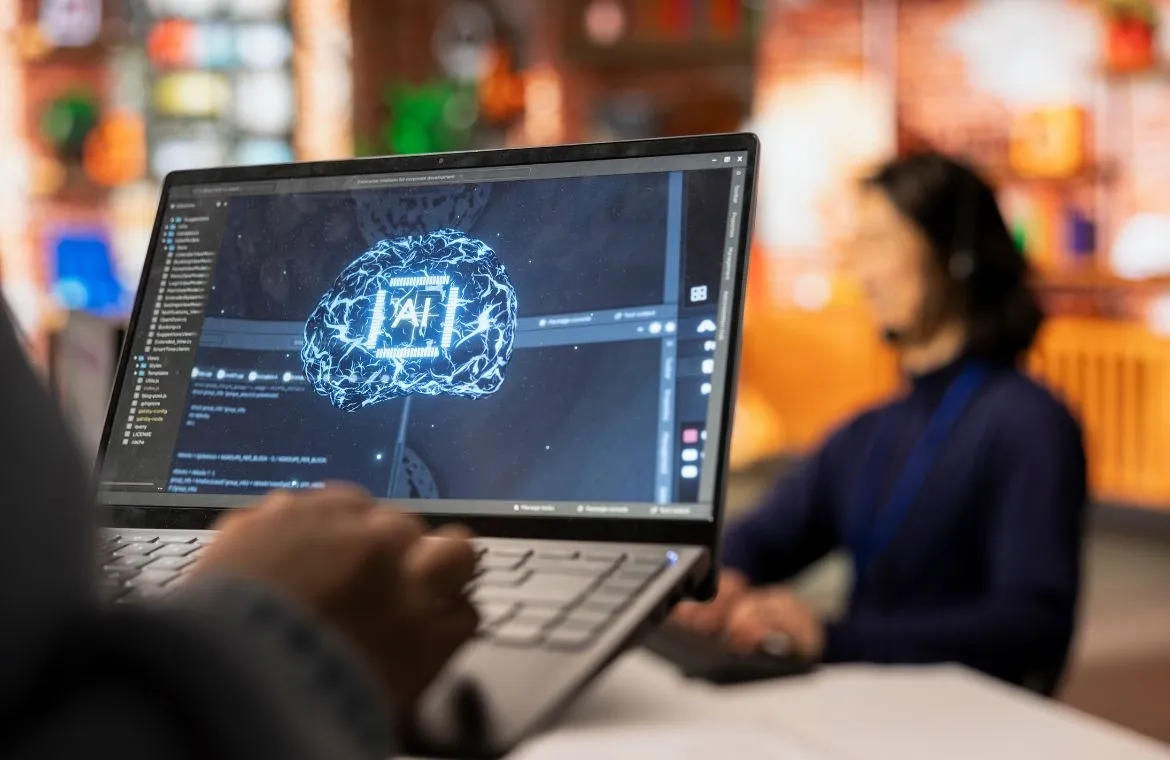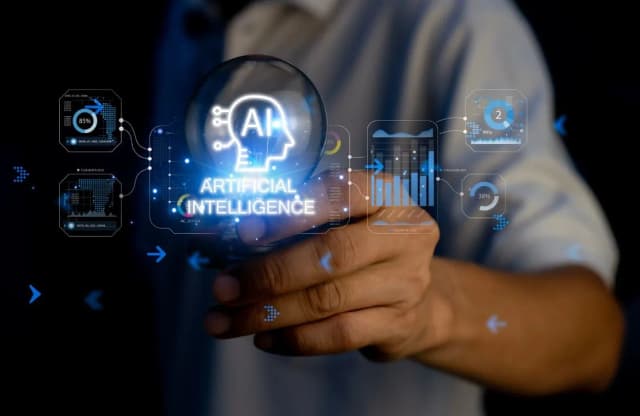What is AI in Business?

Walk into any modern workplace today, and you’ll notice something interesting that
there’s a new “team member” that everyone relies on, yet no one ever sees. It doesn’t take lunch breaks; it doesn’t call in sick, and it never sleeps.
But it quietly powers decisions, speeds up tasks, and uncovers insights humans would take weeks to find.
That invisible teammate is AI.
From predicting customer behavior to automating workflows and improving decision-making, AI is reshaping the business world in ways we couldn’t imagine a decade ago.
What is AI in Business?
AI in business means using smart computer systems to help companies work faster, make better decisions, and serve customers more efficiently. Instead of doing everything manually, businesses now rely on AI to automate tasks, analyse data, and even predict what might happen next.
“AI in business is giving companies a “smart assistant” that never gets tired.”
How AI is Being Used in Different Business Functions?
Companies across industries now use AI technologies to boost operations in many business areas. Here's how AI is reshaping key business functions in 2025:
1. Marketing & Customer Engagement
AI has transformed marketing by creating personalised customer experiences on a scale. AI tools analyse customer data to spot patterns and predict what consumers will do next. E-commerce platforms use AI-powered recommendation engines that suggest products based on each person's choices and buying history, which makes the customer experience better.
For example:
- Amazon's Recommendation Engine
analyses your browsing history, search terms, and even how long you hover on a product. - Netflix’s Hyper-Personalised Content
AI predicts what movies you’ll love based on watch time, genre preferences, and your reactions to previous recommendations. - Coca-Cola’s Trend Analysis
They scan millions of social media photos using AI to understand beverage trends and design campaigns people care about.
Also Read: A Complete Overview of AI in Marketing
2. Sales
Sales leaders strongly support AI adoption, especially when dealing with longer B2B sales cycles and bigger deals. Teams use conversational AI to suggest products and find opportunities to sell more. Research shows that by 2027, 95% of seller research workflows will start with AI, up from less than 20% in 2024.
For Example:
- HubSpot’s AI Assistant
It writes follow-up emails, summarises calls, and even updates the CRM automatically. - Sephora’s AI Shopping Assistant
Helps customers pick products, increasing both customer satisfaction and sales.
3. Customer Support
Customer service has improved with AI tools that provide quick, personalised help with minimal human input. Virtual assistants and chatbots understand what customers need and respond right away on different platforms.
For Example:
- Swiggy & Zomato
Their AI assistants solve order issues in seconds, freeing humans from repetitive queries. - Air India’s AI Chat Assistant
Provides booking updates, rescheduling options, and flight info 24/7.
4. Human Resources (HR)
HR has evolved from handling paperwork to playing a strategic role thanks to AI. The technology now helps screen job candidates, personalises employee onboarding, and spots skill gaps through learning platforms.
For Example:
LinkedIn Talent Insights
Shows which candidates have the right skills and cultural fit.
Unilever’s AI Hiring Process
Analyses speech, word choice, and facial expressions in video interviews to shortlist candidates.
5. Finance & Accounting
Financial institutions use AI to work faster, reduce risks, and offer better services. They use it for credit scoring, catching fraud, trading stocks, and checking compliance. AI reduces manual work, makes processes smoother, and catches fewer errors while better predicting potential risks
For Example:
- PayPal’s Fraud Detection System
Identifies fraudulent patterns within milliseconds. - Mastercard’s Transaction AI
Judges whether a transaction is real or fraudulent in real time.
6. Operations & Supply Chain
AI helps companies optimise their supply chains from start to finish. It spots possible delays, finds better delivery routes, manages warehouse stock, and checks product quality. AI can suggest different shipping routes based on traffic and weather, which helps avoid unexpected delays.
For Example:
- Walmart
Predicts product demand, prevents stockouts, and optimises deliveries using AI. - Toyota Smart Factories
AI-powered cameras detect manufacturing defects instantly.
7. Product Development
Generative AI has changed how companies create new products by speeding up development cycles. Teams use AI to research competitors, write code for new features, and create prototypes quickly.
For Example:
- Adobe Firefly
Designers instantly create variations and concepts that used to take days. - Reddit’s AI Prototyping
Teams can go from idea → functional prototype within 24 hours. - Tesla’s AI Simulations
Trains self-driving models using AI-generated driving scenarios.
8. IT & Cybersecurity
Companies protect themselves better with AI that spots threats, analyses data, finds patterns, and responds to security problems instantly. They use it to detect unusual activity, prevent malware, spot intruders, and stop fraud.
AI generates summaries of security alerts and automatically responds to incidents, speeding investigations by 55%. As cyber threats get more complex, AI's ability to learn and adapt makes it essential for
For Example:
- Microsoft Security Copilot
Summarises security incidents and suggests responses, cutting investigation time. - Google Cloud’s AI Security
Analyses global attack patterns to block threats before they hit.
Conclusion
AI in business isn’t about robots taking over offices or replacing people.
It’s about augmenting human decision-making, simplifying complex tasks, and helping companies move smarter and faster.
Every day, businesses quietly rely on AI to keep their engines running, and in every function, be it be, marketing, sales, finance, HR, operations, or customer support, AI is transforming how businesses think, move, and grow.
So, AI in business is no longer a luxury or a distant innovation.
It’s the new electricity that powers systems, decisions, and experiences everywhere.
Frequently Asked Questions
Q1. How can businesses start implementing AI in 2025?
To implement AI, businesses should first identify areas where AI can add value, such as customer service or data analysis. Next, invest in the necessary infrastructure and tools, and ensure your team has the right skills. Start with small, manageable projects to build confidence and experience before scaling up to larger AI initiatives.
Q2. What are the most promising AI applications for businesses in 2025?
Some of the most promising AI applications include personalised marketing and customer engagement, predictive analytics for sales forecasting, AI-powered chatbots for customer support, automated supply chain optimisation, and AI-assisted product development. The specific applications will vary depending on your industry and business needs.
Q3. How will AI impact the workforce by 2025?
AI is expected to both create new job opportunities and displace some existing roles. While it may automate certain tasks, it will also create demand for new skills related to AI development, implementation, and management. Businesses should focus on reskilling and upskilling their workforce to adapt to these changes.

TalentSprint
TalentSprint is a leading deep-tech education company. It partners with esteemed academic institutions and global corporations to offer advanced learning programs in deep-tech, management, and emerging technologies. Known for its high-impact programs co-created with think tanks and experts, TalentSprint blends academic expertise with practical industry experience.



